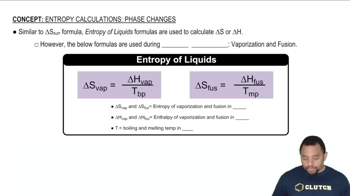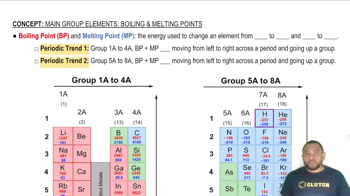Here are the essential concepts you must grasp in order to answer the question correctly.
Phase Changes
Phase changes refer to the transitions between solid, liquid, and gas states of matter. These changes occur when a substance absorbs or releases energy, typically in the form of heat. For mercury, phase changes will occur at its melting point (-38.8 °C) and boiling point (356.6 °C), where it transitions from solid to liquid and from liquid to gas, respectively.
Recommended video:
Melting Point and Boiling Point
The melting point is the temperature at which a solid becomes a liquid, while the boiling point is the temperature at which a liquid turns into a gas. For mercury, the melting point is -38.8 °C, meaning it will be in a solid state below this temperature, and the boiling point is 356.6 °C, indicating it will remain a liquid until this temperature is reached at 1.0 atm pressure.
Recommended video:
Boiling Point and Melting Point
Effect of Pressure on Phase Changes
Pressure can significantly influence the phase changes of substances. At 1.0 atm, the standard atmospheric pressure, mercury's phase transitions occur at its defined melting and boiling points. Understanding how pressure affects these points is crucial for predicting the state of mercury under varying temperature conditions, as higher pressures can raise boiling points and lower melting points.
Recommended video:
 Verified step by step guidance
Verified step by step guidance


